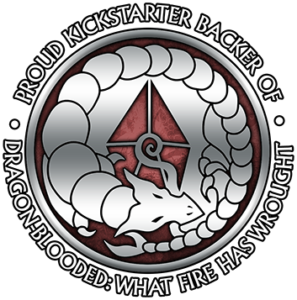Caerdwyn writes with his saliva on the wall of the dry fountain room, and manages to open a door where there was only a wall before. To both of them it felt not quite like unsealing a door as pulling pieces of Nightstone together as they both pushed away from each other and tried to turn away and fall together all at once.
Beyond the door, they got their first taste of the blue-white ghostlight of the guts of Builder structures. The kind of flickering-at-the-edges of sight glow that didn’t so much shine from the structure as exist between the interlopers and the seamless stone of the structures.
A hallway led them down and into a vast egg of an open space. A railingless parapet extended in a perfect semicircle out into the space. Stairsteps extended to either side along the gentle curve of the walls, in the direction of the floor.
Without checking, or counting or in any other way discerning it, both of them knew there exactly 109 steps in each staircase leading to the gently sloping floor of the room. Down the right-hand staircase, there was a crude wooden slingshot. Down the left-hand staircase, there was a small, worn cube of wood, painted different faded colors on each side.
With caution born of strangeness and intelligence, they made their way cautiously down the steps. On the 42nd step, they took up the slingshot. On the 63rd step, they took up the cube that had some chewing marks on the green side, where the paint had come off. Something about the light or the place either imbued deep meaning into things or made them less able to discern import.
They approached the plinth at the base of the egg. Scattered around it were shards of broken glass, unmarked by dust. Nothing, they realized, in the Builder structure yet had been covered in dust – not the cube or the child’s sling or the pedestal or the glass or the steps.
The broken glass must have been held by the carved godsblood hand that rested atop the plinth. Beside it was the only object they had ever seen – other than the structures themselves – made from the imperishable Builder’s stone. It was a low goblet.
On the side of the plinth, there were Letters, written by a bloody finger. Caerdwyn, after a moment, deciphered them as the Old Tongue word for Revelation. Some other student tutored formally in the Talent had been here before them. Not interested in shedding blood, Caerdwyn used some more of his saliva to freshen the blood on the plinth.
A snatch of vision swept over him: the long knobbly string of mountains that ran from Cathal to Teuthal. A hilltop, a distant twisting Culae (Builder) tower high in the background on another mountain. A circle of moss-covered standing stones. A woman standing amid the stones, blond hair burning in the light. All about the feet of the mountains was mist, or clouds, or fog. It writhed as though with life. The woman cried out. There was a flash atop the Builder tower. The stones seemed to groan. The mist came rushing, like a pack of wolves, up the mountains, slallowing stone and earth and greensward as it came.
They elected to leave the plinth and its contents as they were, and to leave behind the two boys artifacts, evidence that once, Arric and Saar did find their way down into this place. Curious that the Builder structure had almost seemed to want them to understand that part of the story.
Convinced by their experiences of at least the root of Saar’s story, the duo emerged from the depths of the Builder structure and arranged another audience with Lord Marric. Caerdwyn reveled his identity, his true purpose in being there. He tested Marric’s other children and found them lacking the Talent. He told the Lord that with his permission, he would take Saar from Tar Tranwyn, and he and Bayeo would find out what happened to Arric, and what the truth of these dangerous stories really was.

 RSS - Posts
RSS - Posts
(Shoot, typed up a big long comment and the browser et it)
Here was where the stakes felt like they were rising. This underscored how alien and wonderous and powerful the Builders really were. This scene really came alive, very unnerving and at the same time, easy to imagine.
There was a newness to this setting that was really exciting, though it bred uncertainty as well. But I remember really being taken up in the exoticness of this setting, though it felt real and its people alive.
I remember being really unsettled by the attitudes toward writing in this world. In a strange way it made me sympathize with the people of Teuthal (and Mawr) less, probably because of my own intimate love of the written word (moreso than the spoken). I think I would find more and more ways to “not sympathize” with especially the people of Teuthal as the games rolled on, but I wonder if this one fact colored me from the get-go. It also would create some interesting dichotomy with my attitude toward the bards: On the whole I rather like them, but I also sort of hate them too.
I don’t know if it was this game or a little later, but I very early on gained the sense that Pol, as a Storyteller, was really trying to spin Arcodd on its head from what it used to be (ala Rolemaster days), maybe as a kind of inside-joke or homage. I know certainly I’ve done that same thing with some of my own creations, at least to a lesser extent. But in a way, it made me long for a single session where we could have seen the ‘traditional’ Arcodd in a ‘conventional’ scenario, so that we could really appreciate the transformation.